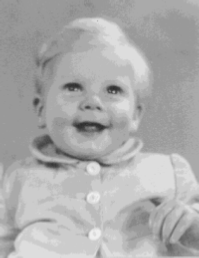



The Parish Church of St George the Martyr, Waterlooville

Whatever happens the world still goes on and so it was now; although nothing seemed to change. Slowly we had grown used to our life on restrictions, so put up with strikes, long queues, cold winters, rainy summers, hot summers, with few coastal beaches open owing to mines, but we had our cricket and our football to be listened to over the radio. Through these troublesome times the children were well looked after and they thrived on their rationed diet of milk, orange juice, porridge, vegetables, sometimes now some of the American tinned baby food, usually carrots or spinach. Tony seemed to thrive on it, he was walking at 10 months, and as there were always people coming and going who made a fuss of him he talked at a very early age. I can’t remember exactly when. At one year old I was able to buy him some clothes, it was a blue corduroy coat, leggings and a hat, also a pair of real leather shoes with the coupons allowed. He was very smart after being in home knitted outfits of baby clothes. He lived in it until he grew too big when it was passed on to another little boy.
We were not to remain without any troubles. We had a Labour Government from the July 1945 and Churchill had to take a back seat, he had been a wonderful war leader, but change was in the air and a majority wanted it now, so we got the beginnings of the Welfare State, with the National Health which meant free medicine, free hospitals, free doctors, free milk for children etc. etc. and with all this there was Nationalization and other high minded ideas which all seemed to be wonderful.
All this was to make a great change in our personal lives. The family coal mines were nationalised, and all coal businesses were taken over by the state, my father-
Of course there were many like us, and as there was no welfare state you were on your own unless you were in a union. So we took a pub! One we were offered was on the borders of Herts and Cambridgeshire and Bedfordshire, so it was up sticks and leave many friends. But everything was changing, the landgirls were going, it was so sad, we had all been so happy together. One stayed on to come with us. She didn’t fancy going home to the East End of London after being in the country. She was a great help in this upheaval and only left a couple of years later to get married. We should also miss the farm, but even that had changed over the years. It had been sold to a London Businessman and he was into mechanisation. All the horses but the two shires at the beginning of the war had gone and the tractor had arrived. He got rid of a lot of the old farm workers but one man was kept on. We had lots of amusing tales from him in the local at night. His name was Frankie Brunt, small, almost a dwarf, hunched backed with a small clay pipe always in his mouth. He could do everything, drive a couple of Shire horses at the plough, shear sheep, milk cows, and even learnt to drive a tractor so was a treasure for the new owner. One tale always makes me laugh. Amongst the farm’s old and many workers there was a woman in the village who worked in the house as what was known in those times as a “scrubber”, she did the rough work and amongst many of her chores scrubbed the square paving stones which paved the entrance to the farm house and the hall, but during a ’flu epidemic which was in the village, and had laid low some of the girls who worked in the house, she had to do the morning round of making beds and generally clearing up the rooms whilst breakfast was being consumed by the owner and his wife, a rather lofty lady. She popped her head round the door one morning and said “Mornin’ Sur. ’Aint you n’or your missus used no poes this mornin’?” I can well imagine how this must have been received. She soon got the sack, so away went another character. We were all so sad to leave the village, but it would never be the same again. Now all our wonderful cornfields that led down to the common and village cricket green have become covered with houses.
So here we were running a pub. It was fairly newly built, nothing very old or romantic, but modern for those days with a lot of out-
The running of the pub was hard work, long hours, and little time off but the town of Baldock was very old and interesting. The old north road, the A1, went straight through it, so we were never without visitors. Our friends could visit easily, and Newmarket was fairly close with its many racing days on which there was always an influx of owners, trainers, jockeys, many of which called in. The town itself had always been important owing to the main road to the north, and it had quite a few remains of the time when it was a Knights Templars town in the time of the Crusades. In modern times it had become a main stop for coaches on their way north through the centre of the town, and when we lived there the coach stop was in the square outside two enormous gates, leading to the old ruined Knights hostelry, for the travellers to the Holy Land. All this has gone over the years, but it is still a coach stop or was up to a few years ago when we stopped there on our way to Walsingham, but of course there was no sign of anything so romantic. The church was large, and there was a short cut from our pub through the church grounds to the town, this alley way was supposed to be haunted, whether or not this was true I don’t know but the terrier dog we had at the time would not go through there after dark. I never met the ghost but it was really eerie. The vicar used to pop in and see us at times. He was an interesting man and said because of his calling he couldn’t be a regular but as he had only been able to accept the living when his wife had inherited money from the family brewery, he felt he should keep in touch with the customers. He was so interesting that he stirred in me a feeling that one of these days, I would like to worship in such a church. He also told me about a nursery school, one of the first nursery schools which had appeared during the war so mothers could help in the factories. The hours were from 8.am to 5.pm and it was now opened to any mothers who worked. He said I would be welcome to take Tony along. This I did and found it to be situated in a sylvan wood on the edge of the town, and was extremely well run. The children had a playground with the usual equipment, a break in the morning with milk, lunch and a ½ hour's rest in the afternoon, after which they had painting, reading, and other early lessons. Behaviour was strict, especially for the using of bad words, when the mouth had to be wiped out with soap. I wonder what effect that would have today.
Now we settled down to a completely different life which was very hard but enjoyable.
Ruby Bullock
• to be continued.
Winter and Lent Edition 2010
Ruby’s Memoirs
14. Post-

So the war dragged on with more stringent rationing and restrictions and it was a great relief to everyone when at last we forced the Germans into an unconditional surrender in the summer of 1945.
On the home front our life was unchanged with the Japanese still at war with us and our Allies. The Army out East in which there were many Australians with Americans was hard pushed in jungle warfare. We now had news of our forgotten Army, underarmed, undermanned and ill equipped, as we had been so occupied in Europe. Now everything we had was shipped out East in great haste to give all possible help. We at least had peace here to take stock of all the damage in both Europe and at home, the refugees and lack of housing for our troops on their demobilization, and learnt a great deal about the terrible suffering caused by war.
From the end of the war to 1950 we had personally suffered from the deaths of my mother and father, Ted's father as well as my sister’s husband so all round it was a pretty dismal time. It was with great relief to everyone that there was a sudden end to the Japanese War by the dropping of the H Bombs, I am sure everyone who was old enough welcomed it although so terrible for the people who encountered it, there was the saving of thousands of lives that would have been lost.